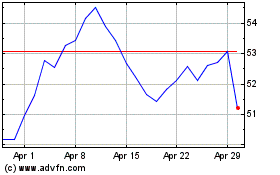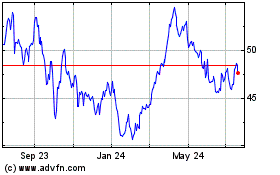UNITED STATES
SECURITIES AND EXCHANGE COMMISSION
Washington, D.C. 20549
SCHEDULE 14A
INFORMATION
Proxy Statement Pursuant to Section 14(a) of the
Securities Exchange Act of 1934
(Amendment No. 1)
Filed by the
Registrant x Filed by
a Party other than the Registrant ¨
Check the appropriate box:
|
|
|
| ¨ |
|
Preliminary Proxy Statement |
|
|
| ¨ |
|
Confidential, for Use of the Commission Only (as permitted by Rule 14a-6(e)(2)) |
|
|
| x |
|
Definitive Proxy Statement |
|
|
| ¨ |
|
Definitive Additional Materials |
|
|
| ¨ |
|
Soliciting Material under Rule 14a-12 |
DEVON ENERGY
CORPORATION
(Name of Registrant as Specified In Its Charter)
(Name of Person(s) Filing Proxy Statement, if other than the Registrant)
Payment of Filing Fee (Check the appropriate box):
|
|
|
|
|
|
|
| x |
|
No fee required. |
|
|
| ¨ |
|
Fee computed on table below per Exchange Act Rules 14a-6(i)(4) and 0-11. |
|
|
|
|
|
(1) |
|
Title of each class of securities to which transaction applies:
|
|
|
(2) |
|
Aggregate number of securities to which transaction applies:
|
|
|
(3) |
|
Per unit price or other underlying value of transaction computed pursuant to Exchange Act Rule 0-11 (set forth the amount on which the filing
fee is calculated and state how it was determined):
|
|
|
(4) |
|
Proposed maximum aggregate value of transaction:
|
|
|
(5) |
|
Total fee paid:
|
|
|
| ¨ |
|
Fee paid previously with preliminary materials. |
|
|
| ¨ |
|
Check box if any part of the fee is offset as provided by Exchange Act Rule 0-11(a)(2) and identify the filing for which the offsetting fee was paid previously. Identify the previous filing by registration statement
number, or the Form or Schedule and the date of its filing. |
|
|
|
|
|
(1) |
|
Amount Previously Paid:
|
|
|
(2) |
|
Form, Schedule or Registration Statement No.:
|
|
|
(3) |
|
Filing Party:
|
|
|
(4) |
|
Date Filed:
|
EXPLANATORY STATEMENT
This Amendment No. 1 to the Definitive Proxy Statement of Devon Energy Corporation (the “Company”) amends and supersedes only those items of
the Definitive Proxy Statement originally filed on April 21, 2015 (the “Proxy Statement”) which are contained in this Amendment. All other information in the Proxy Statement remains unchanged.
The Company is providing this supplement solely to correct an inadvertent error in the Proxy Statement. Specifically, the “Agenda Item 7.
Stockholder Proposal For A Report Disclosing Lobbying Policy And Activity” on pages 98–100 of the Proxy Statement, as originally filed, included an incomplete version of the Supporting Statement to the Stockholder Proposal. The corrected
Agenda Item 7 set forth below amends, replaces and corrects Agenda Item 7 as contained in the Proxy Statement. If you have already submitted your proxy, you do not need to take any action unless you wish to change your vote.
AGENDA ITEM 7.
STOCKHOLDER PROPOSAL FOR
A REPORT DISCLOSING LOBBYING POLICY AND ACTIVITY
The Company has been notified by a group of stockholders that they intend to submit the resolution set forth below at the Annual Meeting for action by the
stockholders. Pursuant to Rule 14a-8(l)(1) of the Securities Exchange Act of 1934, the Company will provide the name, address and number of shares of our common stock held by the proponents of the stockholder proposal set forth below promptly upon
receipt of a written or oral request. Requests should be submitted to Devon Energy Corporation, Attention: Corporate Secretary, 333 W. Sheridan Avenue, Oklahoma City, Oklahoma 73102, email: CorporateSecretary@dvn.com or by calling
(405) 235-3611.
Stockholder Proposal
Whereas, corporate lobbying exposes our company to risks that could adversely affect the company’s stated goals, objectives, and ultimately
stockholder value, and
Whereas, we rely on the information provided by our company to evaluate goals and objectives, and we, therefore, have
a strong interest in full disclosure of our company’s lobbying to assess whether our company’s lobbying is consistent with its expressed goals and in the best interests of stockholders and long-term value.
Resolved, the stockholders of Devon Energy Corporation (“Devon”) request the Board authorize the preparation of a report, updated
annually, disclosing:
| |
1. |
Company policy and procedures governing lobbying, both direct and indirect, and grassroots lobbying communications. |
| |
2. |
Payments by Devon used for (a) direct or indirect lobbying or (b) grassroots lobbying communications, in each case including the amount of the payment and the recipient. |
| |
3. |
Devon’s membership in and payments to any tax-exempt organization that writes and endorses model legislation. |
| |
4. |
Description of the decision making process and oversight by management and the Board for making payments described in section 2 and 3 above. |
For purposes of this proposal, a “grassroots lobbying communication” is a communication directed to the general public that (a) refers to
specific legislation or regulation, (b) reflects a view on the legislation or regulation and (c) encourages the recipient of the communication to take action with respect to the legislation or regulation. “Indirect lobbying” is
lobbying engaged in by a trade association or other organization of which Devon is a member.
Both “direct and indirect lobbying” and “grassroots lobbying communications” include efforts
at the local, state and federal levels.
The report shall be presented to the Audit Committee or other relevant oversight committees and posted on
Devon’s website.
Supporting Statement
As
stockholders, we encourage transparency and accountability in the use of staff time and corporate funds to influence legislation and regulation both directly and indirectly. Devon is listed as a member of the National Association of Manufacturers
and American Petroleum Institute, which together spent over $33.4 million lobbying in 2012 and 2013. Devon does not disclose its memberships in, or payments to, trade associations, or the portions of such amounts used for lobbying. Absent a system
of accountability, company assets could be used for objectives contrary to Devon’s long-term interests.
Devon spent $2.99 million in 2012 and 2013
on direct federal lobbying activities (opensecrets.org). This figure does not include lobbying expenditures in states, where Devon also lobbies but disclosure requirements are uneven or absent. Devon’s lobbying of state attorney generals over
federal emission standards has drawn attention (“Energy Firms in Secretive Alliance with Attorneys General,” New York Times, Dec. 6, 2014). And Devon does not disclose membership in or contributions to tax-exempt organizations that
write and endorse model legislation, such as its membership in and contributions to the American Legislative Exchange Council (ALEC). More than 90 companies, including Ameren, Occidental Petroleum and Xcel Energy, have publicly left ALEC.
We urge support for this proposal.
Our Board of Directors
recommends that stockholders vote “AGAINST” the proposal for the preparation of a report disclosing lobbying policy and activity.
Opposition Statement of the Company: This proposal requests the Board of Directors to authorize the preparation of a report disclosing the
Company’s lobbying policies, procedures and practices. For the reasons discussed below, the Board of Directors recommends a vote “AGAINST” this stockholder proposal.
We believe that participation in the political, legislative and regulatory processes—at all levels of government—is vital to our business. As such,
we actively advocate on public policy issues relevant to our business and are committed to doing so in full compliance with applicable laws. The Board of Directors believes that the Company’s current disclosures regarding lobbying practices and
procedures are significant, adequate and accessible. The Board of Directors agrees with the stockholder proponents regarding the importance of transparency and accountability with respect to use of corporate funds. However, we currently provide
extensive disclosures regarding our lobbying practices and policies.
Nearly seven years ago, Congress passed the Honest Leadership and Open Government
Act, which amended parts of the Lobbying Disclosure Act of 1995 and dramatically increased overall required disclosure of lobbying activities. Pursuant to these laws, we provide quarterly reports on the aggregate amount that is spent
on lobbying activities and bill numbers of lobbied legislation, and provide semi-annual reports on political action committee contributions, expenses relating to meetings, conferences and awards of certain officials, and charitable
contributions. These disclosures are publicly available on the Internet through databases maintained by the U.S. House of Representatives and U.S. Senate at http://lobbyingdisclosure.house.gov/ and
http://soprweb.senate.gov/index.cfm?event=lobbyistselectfields, respectively. We also disclose lobbying activities pursuant to applicable state law, including Montana, New Mexico, Texas, Wyoming and Oklahoma, and these reports are publicly available
through state websites.
All lobbying activities conducted by the Company and its employees must comply with applicable law and our
“Code of Business Conduct and Ethics,” which is available through our corporate website at www.devonenergy.com. Devon has adopted a Political Contributions and Activities Policy, which is included in our “Code of Business Conduct and
Ethics,” that sets forth the general requirements for the lobbying activities of Devon. As noted in the Political Contributions and Activities Policy, the Company’s Vice President—Public and Government Affairs oversees the
Company’s lobbying practices and procedures.
Given our current policies and level of disclosure with respect to lobbying activities, the Board of
Directors believes that the proposal is unnecessary. The Board of Directors also believes that additional disclosures with respect to lobbying practices would not provide useful information to our stockholders. As evidenced by the proponent’s
supporting statement, information concerning our lobbying activities is already available.
We do not directly influence how the trade associations to
which we contribute spend monies for lobbying purposes, nor is lobbying our only purpose for joining such associations. We participate in trade associations for a variety of reasons, including networking, civic participation and monitoring of
industry policies and trends.
The Board of Directors believes that the currently available information with respect to lobbying activities strikes the
appropriate balance between transparency and excessive burden and cost. This proposal’s requirements would tip this balance, resulting in the waste of valuable time and corporate resources tracking immaterial activity without materially
altering the publicly available disclosure that currently exists. Furthermore, by mandating the disclosure of certain trade association dues, adoption of the proposed policy may require the disclosure of proprietary information, which could raise
other potential competitive and business-related concerns. The Board of Directors believes that our current disclosure, along with our process described above, is appropriate and in the best interest of the Company and our stockholders.
Finally, the Board of Directors opposes this resolution because many aspects of the proposal are vague or unworkable and may create confusion. For example,
the definition of lobbying and the payments that would be considered lobbying-related vary from jurisdiction to jurisdiction and could include employee salaries, office rent, certain charitable contributions and employee travel expenses.
Consequently, any listing of lobbying-related payments would be inconsistent and potentially confusing, because a particular payment may be considered “lobbying-related” in one jurisdiction but not in another.
In summary, this proposal seeks to impose requirements that are not required by law and are not standard among other companies. We already comply with
existing regulations on disclosure and reporting of lobbying activities, and those reports are publicly available to our stockholders. We believe that preparing and publishing the additional information requested by this proposal would result in an
unnecessary and unproductive use of the Company’s resources, and therefore would not be in the best interests of the Company or our stockholders.
For the foregoing reasons, our Board of Directors recommends that stockholders vote “AGAINST” the proposal for a report disclosing lobbying
policy and activity.
Devon Energy (NYSE:DVN)
Historical Stock Chart
From Mar 2024 to Apr 2024

Devon Energy (NYSE:DVN)
Historical Stock Chart
From Apr 2023 to Apr 2024
